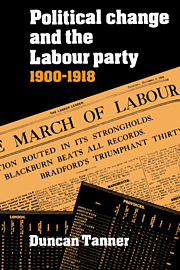Book contents
- Frontmatter
- Contents
- List of tables
- Preface
- Abbreviations
- Introduction
- PART I POLITICS AT THE CENTRE
- PART II POLITICS IN THE CONSTITUENCIES
- 4 The electoral framework of Edwardian politics
- 5 The North-West
- 6 The Tory regions
- 7 The coalfields
- 8 The heavy industrial heartlands
- 9 Yorkshire
- 10 Liberalism's reserve army
- PART III AN INTEGRATED PICTURE
- PART IV THE POLITICS OF CHANGE
- CONCLUSION
- APPENDICES
- Bibliography
- Index
10 - Liberalism's reserve army
Published online by Cambridge University Press: 24 October 2009
- Frontmatter
- Contents
- List of tables
- Preface
- Abbreviations
- Introduction
- PART I POLITICS AT THE CENTRE
- PART II POLITICS IN THE CONSTITUENCIES
- 4 The electoral framework of Edwardian politics
- 5 The North-West
- 6 The Tory regions
- 7 The coalfields
- 8 The heavy industrial heartlands
- 9 Yorkshire
- 10 Liberalism's reserve army
- PART III AN INTEGRATED PICTURE
- PART IV THE POLITICS OF CHANGE
- CONCLUSION
- APPENDICES
- Bibliography
- Index
Summary
Edwardian New Liberals frequently pointed to the existence of a North/South divide in British politics. They tried to convince their party leaders that they had to cater primarily for the northern and radical side of the party's constituency if the Liberal party was to survive. They may have convinced Lloyd George to tilt the balance of party policy in that direction. Historians have certainly focused on the shift of Liberal support towards the North. Yet the idea of a North/South divide does not do justice to the complexities of the Liberals' political image, and to the nature of their electoral constituency. Shifting the balance towards the North did not involve ignoring the South; being attentive to ‘northern’ working-class interests did not mean that the party abandoned the idea of organic progress and a broad appeal. On the contrary, the Liberal party was such a strong force because, in addition to its ability to gain support in the industrial areas which we now associate with the Labour party, it had reserves of strength in the South. It returned MPs in a whole range of scattered, varied, ‘southern’ industrial seats, stretching from East Anglia to Staffordshire and from Exeter to Reading. Labour had to win seats of this kind, or stop the Liberals from doing so, if it was to become the largest party in a three party system; the Liberals had to hold them if they were to remain the party of government.
- Type
- Chapter
- Information
- Political Change and the Labour Party 1900–1918 , pp. 284 - 314Publisher: Cambridge University PressPrint publication year: 1990



